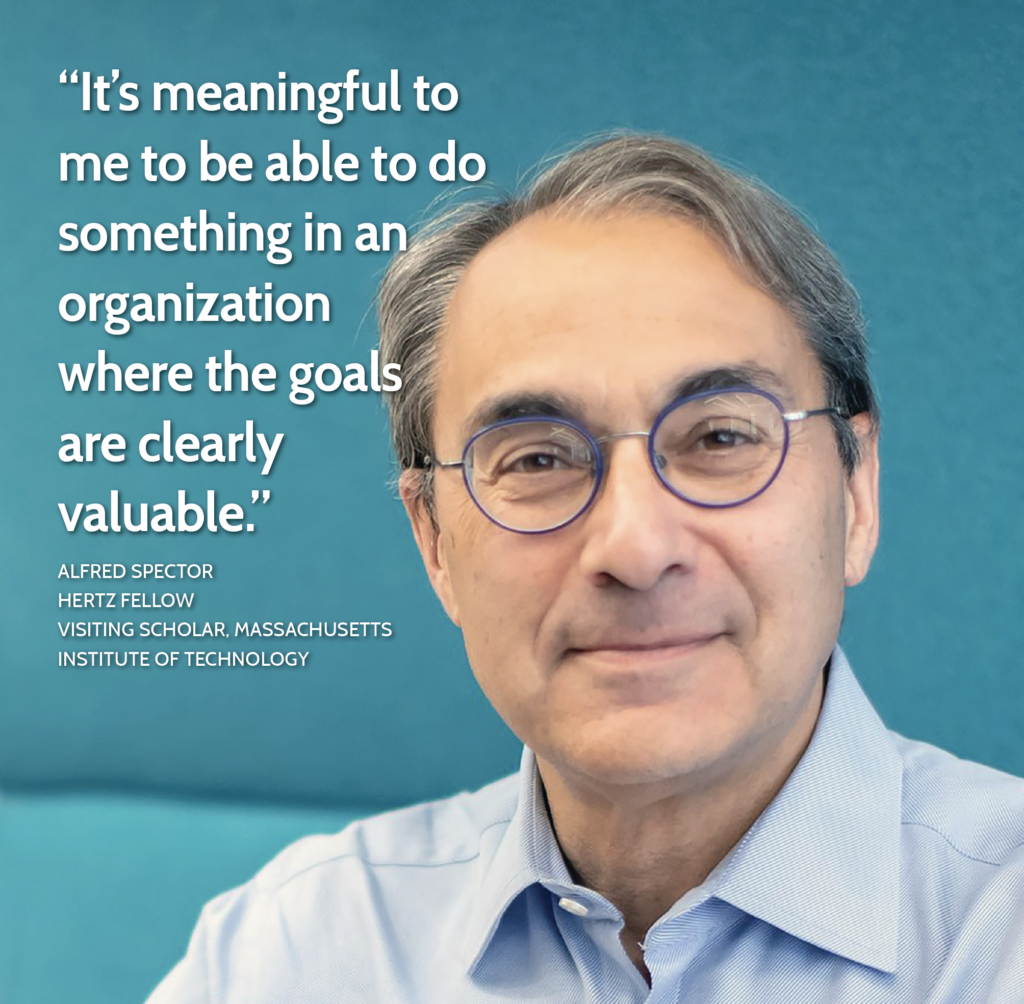
Giving to Hertz: Small Foundation Means Amplified Impact
For Hertz Fellow Alfred Spector the most compelling reason to give to the Hertz Foundation is simple. “The organization is small enough that I can see the impact,” he said.
Spector and his wife fund the Alfred Spector and Rhonda Kost Family Fellowship, currently held by 2018 Hertz Fellow Iris Cong.
“There are many fantastic organizations in the world, but for most of us, our contribution is just a very small part. It’s meaningful to me to be able to do something in an organization where the goals are clearly valuable and my contribution is actually significant and makes a difference,” Spector said.
Why Hertz?
The Hertz Foundation has a powerful brand, talent pool and infrastructure for finding students who are likely to be impactful. To catalyze this combination, he said, “Add money and stir.”
The freedom to innovate afforded by the Hertz Fellowship had an enormous impact on his own career. A 1977 Hertz Fellow, he pursued a Ph.D. at Stanford University, where his thesis was “Multiprocessing Architectures for Local Computer Networks.”
“I was someone who had a research concept that was somewhat different than what the faculty at Stanford were then pursuing,” Spector said. “I was able to pursue my vision, which integrated ideas from Xerox Palo Alto Research Center, IBM Research and the Stanford computer science department. My thesis was well regarded and somewhat different because of that. It set a precedent for many years of work, which integrated topics in distributed science with the needs of large enterprise computing.”

Spanning Industry and Academia
Spector’s career has spanned academia and industry. Launching his career as a computer science professor at Carnegie Mellon University, where he also was director of the Information Technology Center, he then founded Transarc Corp. to commercialize the distributed systems software developed at CMU. He later moved into vice president roles at IBM and Google, where he was the global head of research. Following that, he became chief technology officer and head of engineering at investment company Two Sigma.
In January 2022, Spector circled back to academia, teaching part time as a visiting scholar at Massachusetts Institute of Technology. His recent book, “Data Science in Context: Foundations, Challenges, Opportunities,” co-authored with Peter Norvig, Chris Wiggins and Jeannette M. Wing (Cambridge University Press), has just become available.
The ubiquity of data and its challenges and opportunities are shaping the future, Spector said. “The techniques of data science will become, in varying ways, commonly used by all Hertz Fellows. Those techniques and that language will be a point of commonality across the foundation’s cohorts.”
In addition to data science, Spector would like to see more focus on developing leadership. “Ph.D.s are not necessarily focused on leadership,” he said. “Graduate programs are designed to teach focus — how to develop clear objectives, make an argument, follow it through, correct it if needed. Programs can also teach collaboration.
“But leadership itself is not really taught so much or discussed. Whether you’re going to be a professor, in industry, in a government lab or in politics, leadership is critical. In fact, I am co-catalyzing a new entrepreneurship program at MIT in order to try to tilt that focus a little bit.”
Spector said one way to learn leadership is through internships, which Hertz Fellows are free to pursue as part of their in-school experience. “Internships are an important place to watch how others lead inside and outside the university environment and see what works and what doesn’t work.”
Some Reflections
Additional advice Spector offers to fellows on the cusp of their careers: Focus on clear and impactful results; do things you enjoy and have passion for; and recognize that in your career, you won’t do everything by yourself.
“So make sure you devote time to listening to others, being with others and brainstorming. In addition to having clarity of goals and liking what you’re doing, pay attention to people and learn from them and contribute to what they’re doing. Those are good ingredients for making progress,” Spector said.